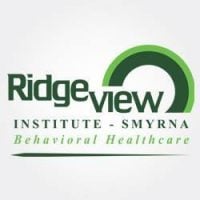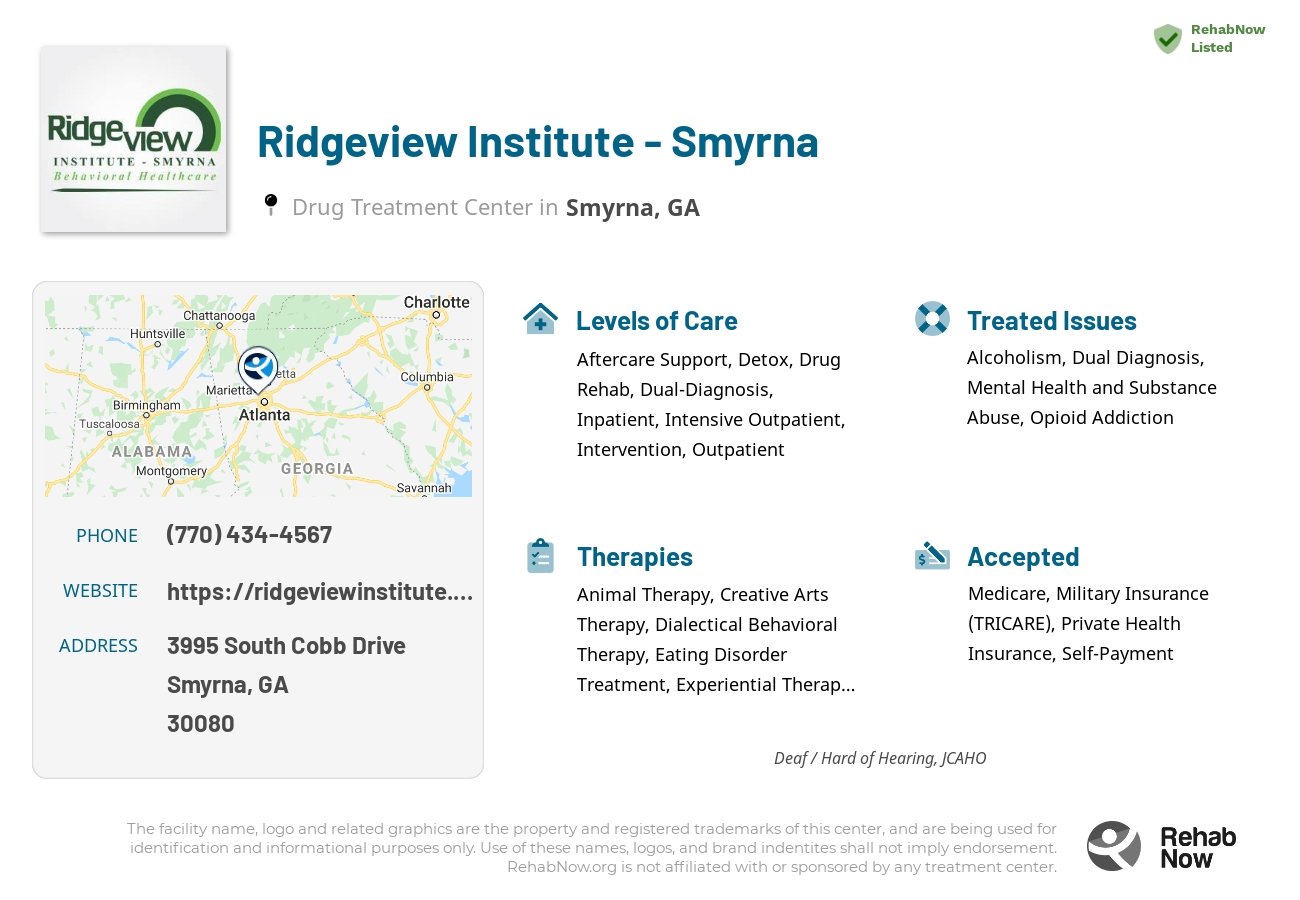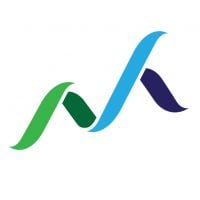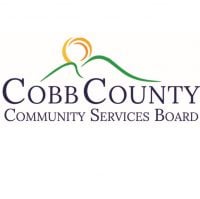Ridgeview Institute - Smyrna
Drug Rehab Center in Smyrna, Georgia
Ridgeview Institute - Smyrna in Smyrna, Georgia is a reputable and accredited treatment facility that specializes in treating alcoholism, dual diagnosis, opioid addiction, eating disorder, drug addiction, mental health, and substance abuse, offering a wide range of services and personalized care to individuals seeking help in overcoming these challenges.
About Ridgeview Institute - Smyrna in Georgia
Ridgeview Institute in Smyrna, GA, stands out as a comprehensive dual diagnosis addiction treatment center, offering personalized care to a diverse clientele including men, women, seniors, and adolescents. This facility is not just about treating substance abuse; it's about addressing the co-occurring mental health disorders in a serene environment, utilizing evidence-based clinical programs rooted in the 12-step philosophy.
- Individualized Treatment Plans: Each patient receives a tailored treatment plan that begins with a comprehensive individual assessment.
- Variety of Programs: From inpatient care specialized for women and adolescents to Intensive Outpatient Programs (IOP) and Partial Hospitalization Programs (PHP).
- Evidence-Based and Accessible: Utilizes evidence-based clinical inpatient and outpatient programs, offering services both in-person and via telehealth.
Accredited by the Joint Commission on Accreditation of Healthcare Organizations (JCAHO), Ridgeview Institute underscores its commitment to high-quality care. This facility is well-equipped to help those struggling with substance abuse and co-occurring mental health disorders through a full continuum of treatment options.
Ridgeview Institute treats a range of addictions and issues including alcoholism, opioid addiction, eating disorders, and more, using a holistic approach that combines inpatient, outpatient, and aftercare support with evidence-based treatment methods. The goal is to equip individuals with the tools necessary for long-term recovery and mental health improvement.
Genders
Ages
Modality
Additional
Accreditations

JCAHO
Conditions and Issues Treated
Treatment for opioid addiction is best made with the help of medical professionals who are experienced in dealing with these types of drugs. This treatment can involve medications, exercise, behavioral therapy, and counseling sessions. It is important to note that the effectiveness of treatments for opioid addiction vary, so it is vital to research which treatment options are suitable for each individual.
Many people who struggle with opioid addiction need to attend specific programs like methadone , Suboxone or Vivitrol clinics.
These types of programs will provide the patient with legal, prescription medications that can help them overcome their cravings for illegal opioids like heroin or fentanyl . If the patient has a chronic condition like Hepatitis C, they must undergo treatment before they can begin taking these medications.
Individuals who are addicted to drugs and/or alcohol often have one or more co-occurring mental health disorders. Addressing both the addiction and the mental health problems at facilities like Ridgeview Institute - Smyrna can be very beneficial for these individuals.
Common mental health conditions that often co-occur with addiction include:
- Anxiety Disorders – People with drug and alcohol problems often suffer from anxiety disorders such as panic disorder, obsessive-compulsive disorder, social anxiety disorder, and generalized anxiety disorder.
- Depression – One of the most common mental illnesses co-occurring with addiction is major depressive disorder.
- Attention-deficit hyperactivity disorder (ADHD) – Many people with drug and alcohol problems also suffer from ADHD.
- Bipolar Disorder – People with bipolar disorder are more likely to suffer from drug and alcohol problems than the general population, and vice versa.
Levels of Care Offered
This center offers a variety of custom treatment tailored to individual recovery. Currently available are Aftercare Support, Detox, Drug Rehab, Dual-Diagnosis, Inpatient, Intensive Outpatient, Intervention, Outpatient, with additional therapies available as listed below.
Detox is the stage of recovery where the drugs or alcohol are entirely removed from your body. There are two different ways to detox, with medications and without. For many drugs and alcohol, the acute phase of detox can be completed in a number of days.
Inpatient recovery offers individual therapy, groups, and family therapy. The length of inpatient addiction treatment depends on the addict and their addiction. Inpatient rehab is a costly drug treatment, costing anywhere from $30k- to $60k. However, insurance often offers help in covering these costs.
An intensive outpatient treatment program, or IOP, is set up for those struggling with an addiction to begin the recovery process. However, the patient will not live at the facility during treatment.
IOP involves patients coming in and out of a medical office building regularly to receive therapy and other services while continuing their life outside of these visits.
IOP is a step up from drug detoxification or alcohol detox. However, it’s still considered a phase of recovery rather than the ultimate goal. There are many rehabs and treatment facilities available to patients in need of IOP.
Outpatient treatment can be considered the lowest intensity level of addiction treatment in Smyrna, GA. It is ideal for early phase addiction or lower intensity addictions. Ridgeview Institute - Smyrna peer group support, 12-step programs, and individual counseling are likely to be involved.
Intervention services can be beneficial for people who have not been able to overcome drug and alcohol addiction on their own. It is recommended for individuals whose addiction has led to dangerous or life-threatening circumstances.
Intervention services are beneficial for:
- People who have relapsed after completing other forms of addiction treatment.
- People with drug addictions that have led to dangerous health conditions, such as HIV.
- People who are at risk of losing their family, home, or job due to addiction.
- People who are having difficulty overcoming drug and alcohol addiction on their own.
- An intervention can be conducted by professionals, or by loved ones of an addict. If the person being intervened on agrees to enter addiction treatment after the intervention, the next step would be to choose a treatment program.
If they do not agree to enter addiction treatment after the intervention, loved ones may choose to go back to the drawing board and try another form of treatment. They may also choose to not receive any further treatment, but there are usually other factors in play that may make it difficult for people to stop using drugs or alcohol.
Aftercare support is vital to those who have completed a drug or alcohol treatment program. This support comes in individual and family counseling, treatment of psychiatric and other medical conditions, and medications to reduce cravings. It helps recovering addicts adjust to normal day-to-day activities and can last for a year or longer.
The majority of drug and alcohol addicts who receive aftercare treatment do not relapse. It is estimated that without aftercare, the relapse rate will be between 70 to 90 percent for most people. Aftercare is the final stage in addiction recovery, but it will also help maintain sobriety if relapse does occur.
Therapies & Programs
Individual therapy is ideal for addicts who want to focus on themselves. It can also be helpful for those whose withdrawal symptoms are exacerbated by the presence of other people.
Benefits of individual therapy are:
- Access to a personalized treatment plan that focuses on the individual needs of the addict
- More privacy during treatment sessions
- Better personal development through introspection
- Increased self-awareness regarding addictive tendencies in order to avoid relapse
- Greater potential for a long-term recovery plan
- Receiving professional advice and detox assistance from medical staff
Family therapy can help you and your family deal with old issues that may trigger substance abuse. The idea behind family therapy for drug addiction is that you are never fully healed from substance abuse until you’ve healed your relationship with your family, too. To get sober, you need to find a different way to cope with the pain in your life.
This is when a group of people in various stages of recovery meet up and discuss their experiences, triggers, successes, failures, and even alternative therapies! Unlike support groups where everyone already knows each other, group therapy is conducted along side outpatient or inpatient treatment at Ridgeview Institute - Smyrna.
Dialectical Behavior Therapy (DBT) is used by drug treatment centers across the United States to help drug addicts become sober. DBT is a type of Cognitive Behavioral Therapy (CBT) that combines traditional behavioral treatments with elements from DBT, including dialectics, distress tolerance, and interlocking issues. Some of the negative behaviors associated with addiction, such as impulsivity and mood swings, are addressed in DBT, while others like craving and isolation are not. It is commonly used to treat Borderline Personality Disorder (BPD) along with substance abuse disorders.
The four DBT modules are mindfulness, interpersonal effectiveness, emotion regulation, and distress tolerance:
- Mindfulness helps recovering addicts learn to identify and experience their emotions while realizing that they are not permanent.
- Interpersonal Effectiveness includes assertiveness, asking for what you need, and saying no while improving communication skills.
- Distress Tolerance has recovering addicts learn how to tolerate distress at the moment and avoid resorting to substance abuse.
- Emotion Regulation is used to identify, express and change emotions.
CBT is a psychotherapy approach and method. [ws-nap-name] people to examine how their thoughts, including habitual harmful and inaccurate thinking, affect their actions. CBT is based on the idea that rigid, inflexible thinking leads to poor stress management, which leads to emotional distress.
Similarly, CBT helps people identify and change negative behaviors. It makes you question your perceptions and ask if they are realistic. CBT asks people to examine their behaviors and emotional responses and how they affect their lives. CBT aims to change people’s thinking and behavior to lead a more balanced and healthy life.
Moreover, CBT has been shown to reduce anxiety disorders, depression, and symptoms associated with harmful thoughts or actions.
Those struggling with addiction can benefit from learning certain life skills. It is not as simple as quitting drinking or taking drugs and thinking that the hard part is over. Being sober means living a whole new way of life. Many recovering addicts have found that they need to develop talents like time management, organization, communication skills, socialization skills, and self-esteem to make their life in sobriety work, Ridgeview Institute - Smyrna is here to help with that.
Patient Experience
Creative Arts
Creative Arts Therapy is one of the most effective types of therapy used in addiction recovery at Ridgeview Institute - Smyrna. The use of art, music, dance, and other creative pursuits stimulate neurogenesis (the growth of new brain cells) which helps increase memory, focus, problem-solving abilities, and self-awareness. It also increases motivation to make changes in one’s life and reduces stress and anxiety, allowing addicts to combat triggers more effectively.
Creative Arts Therapy helps drug users increase their self-awareness. A major factor in addiction is avoidance of emotions, which can be challenging to identify or express. Creative arts therapy helps raise awareness of feelings. It also allows addicts to explore themselves and their relationships with others more deeply, which can help them break the patterns of addictive behavior that have developed.
Experiential Therapy at Ridgeview Institute - Smyrna
Experiential Therapy is a type of therapy that involves activity to recreate situations that may have caused trauma or negative emotions. Experiential therapy at Ridgeview Institute - Smyrna in Smyrna, GA can involve acting, props, arts and crafts, animal care or other tools that may be effective. This therapy is done on an individual basis and can help revisit and heal from past traumas. Trust between the therapist and individual is important for success. Experiential therapy can help you more closely become you and move through life positively and authentically.
Payment Options Accepted
For specific insurance or payment methods please contact us.
Is your insurance accepted?
Ask an expert, call (888) 674-0062
Additional Details
Specifics, location, and helpful extra information.
Smyrna, Georgia 30080 Phone Number(770) 434-4567 Meta DetailsUpdated April 15, 2024
Staff Verified
Ridgeview Institute - Smyrna Patient Reviews
There are no reviews yet. Be the first one to write one.
Smyrna, Georgia Addiction Information
Prescription opioid use has caused a large increase in the total amount of overdoses in Georgia. Almost 12% of the Georgia population uses illicit drugs each year, and slightly over 3.5% also abuses alcohol at the same time. This does not include those who binge-drink at least once a month, which includes 20% of all Georgians.
The drug addiction issue in Smyrna, Georgia, is serious. According to the National Institute on Drug Abuse, 9,015 admissions to treatment facilities for heroin addiction in Smyrna in 2016. There were also 2,936 admissions for cocaine addiction and 2,746 admissions for marijuana addiction. Detox programs are designed to help people transition safely from addiction into a sober lifestyle, by gradually reducing or tapering off their use of drugs or alcohol.
Treatment in Nearby Cities
- Jackson, GA (50.0 mi.)
- Glennville, GA (200.4 mi.)
- Forest Park, GA (18.2 mi.)
- Davisboro, GA (125.6 mi.)
- Atlanta, GA (10.3 mi.)
Centers near Ridgeview Institute - Smyrna
The facility name, logo and brand are the property and registered trademarks of Ridgeview Institute - Smyrna, and are being used for identification and informational purposes only. Use of these names, logos and brands shall not imply endorsement. RehabNow.org is not affiliated with or sponsored by Ridgeview Institute - Smyrna.










